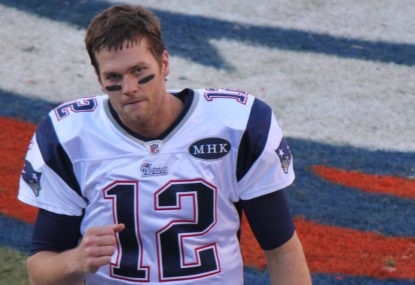Every now and then, sports fans get into heated debates over something that – in the grand scheme of things – is essentially pointless and probably even a little bit silly.
Be that as it may, such discussions remain fun conversations, and some of the very best sporting debates involve arguing about who was a better player between two particular athletes.
Tom Brady versus Peyton Manning.
Larry Bird versus Magic Johnson.
Sachin Tendulkar versus Ricky Ponting.
Johnathan Thurston versus Andrew Johns.
While these arguments often come from a place of sporting knowledge, arriving at a definitive conclusion is a generally futile task, as they frequently have no right or wrong answer.
Likewise, opinions are often based on biased emotion rather than rational thinking. While everyone is entitled to his or her opinion, such attitudes are normally formed well removed from objectivity, which isn’t a great starting point for an argument.
However, when it comes to sport, for as long as there is a scoreboard, winning should factor into the conversation of who was a better player.
The point of the contest is to achieve a victory, so winning is a key variable that needs to be included in the debate.
Winning matters. Period.
It’s why the correct answers to the above debates above are ‘Brady’, ‘Magic’, ‘Ponting’ and ‘not sure’.
Winning is the dealbreaker in every ‘who was better?’ argument. It may not be fair, but here’s a spoiler for you – life isn’t fair.
Maybe Manning wasn’t afforded the luxury of having a genius like Bill Belichick coach him during his career. Tough.
There is no question that Bird’s career was cruelled by injuries, along with the sad death of Len Bias. Unfortunate.
Tendulkar never had the good fortune of Glenn McGrath and Shane Warne in his team. Bad luck.
The JT versus Joey debate isn’t quite so clear-cut, now that Thurston has won a premiership, and played in nine winning State of Origin sides. You could mount a solid case for either legend, though I still have Johns slightly in front.
Of course, it’s worthwhile pointing out that I’m a Pats and Lakers fan from New South Wales. This may affect my adjudication on those aforementioned debates.
Yet winning is a key factor when deciding who was a better player. In fact, I’d go so far as to say it’s the deciding factor, especially when it’s hard to separate individuals based on their other accomplishments.
Take the Bird versus Magic conundrum.
Based on statistics, MVP awards, impact on the league, general level of play, and any other non-championship variable you want to include, they’re essentially neck-and-neck when it comes to their greatness.
Then you throw in Magic’s five titles to Bird’s three, and Magic gets the nod. Add in the fact the Laker point guard made the NBA Finals nine times to Bird’s five, and I’m shutting the gate on that debate.
Winning is as close to empirical as you can get.
Whenever winning is used as a fact in these types of debates, inevitably the ‘ringz’ comment will be bandied about, sarcastically used to mock a player’s championships, premierships, etc, as if to suggest that wins shouldn’t be used as an important variable.
If the argument is that winning alone shouldn’t define a player’s greatness, then I agree.
After all, Eli Manning is not the equal of his older brother Peyton, and Robert Horry is certainly not better than Michael Jordan.
However, to ignore winning is just plain ludicrous.
Deciding a player’s greatness in relation to another’s should encompass all their achievements and play, with winning then casting the ‘deciding vote’.
You can choose to factor in lesser teammates, bad coaches, and poor luck if you like. However, all of these play in the world of hypotheticals, which alters the conversation dramatically, and shifts it into the world of fantasy and ‘what ifs?’. It takes a topic that is already living in a grey area and moves it into an uber grey area.
To be clear, there is no exact science here, no set magic formula for determining such debates, and often not a definitive answer. It’s actually what makes such conversations so enjoyable.
However, I’ll always value winning as something that can separate all-time greats.
Well, as long as it suits my argument, anyway.





























































































